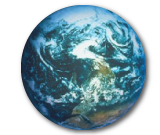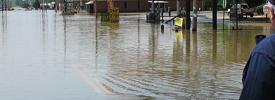January 21, 2025
In the sea as on land, climate change is driving shifts in the abundance and distribution of species. Scientists are just beginning to focus on why some fish predators and prey — like striped bass and menhaden on the U.S. East Coast — are changing their behavior as waters warm.
January 17, 2025
Carbon dioxide is accumulating in the atmosphere faster than ever before, putting hopes of limiting warming in jeopardy.
January 16, 2025
UCLA climate scientist Daniel Swain says that two very wet years followed by a very dry one helped to turn the Los Angeles wildfires into raging infernos. This phenomenon of “hydroclimate whiplash,” he says, is expected to occur in more and more places as the world warms.
January 15, 2025
A new study finds that trees that have lived through many wet years struggle to cope with dry spells.
January 14, 2025
A new analysis shows that African wildlife increasingly depend on lands managed by villagers and herders. In many areas, locally-run conservancies now more effectively protect wildlife than national parks do, with communities reaping tourism revenue and other benefits.
January 13, 2025
In a first, the U.S. saw wind and solar supply more power than coal last year, according to a new analysis. But even as renewables made gains, U.S. emissions stayed flat owing to rising demand for energy.
January 10, 2025
Wildfires in Southern California have burned tens of thousands of acres, destroyed thousands of buildings, and killed at least 10 people. Experts say global warming may have set the stage for the catastrophic blazes.
January 9, 2025
In the last decade, laboratory initiatives to recreate long-extinct species have stirred controversy. Now, scientists increasingly agree "de-extinction" is not possible, but breeding living animals with genes similar to those lost species can be a useful conservation tool.
January 8, 2025
Germany, the largest economy in Europe, got nearly two-thirds of its power from renewables last year, an analysis shows.
January 7, 2025
Huge swaths of North America are facing subfreezing temperatures this week as cold Arctic air pushes southward. Paradoxically, such cold spells may persist or even become more common as the planet warms, scientists say.
January 6, 2025
Producing energy from waves and tides has a stop-and-start history. But with a new U.S. testing site opening in 2026, recent federal investment, and accelerating efforts to reach net zero emissions, developers aiming to harness the vast power of the sea are feeling optimistic.
January 2, 2025
Last year saw warming reach startling new highs, with record heat fueling extreme weather around the world. As farms and cities grow, pollution is spreading and overheating the planet. The evidence of our impact is so profound that it can be seen from space.
December 31, 2024
From floods in Brazil to Hurricane Helene in North Carolina, extreme weather exacted a devastating toll in 2024.
December 30, 2024
The global energy sector defied expectations this year, in ways both good and bad for the climate. Four charts highlight key trends in the transition to clean energy.
December 27, 2024
Trees and shrubs have proliferated in unmanaged forests in the eastern U.S. This growth, which marks a return of trees to the region after centuries of deforestation, is fueling a new surge in wildfires, a study finds.
December 26, 2024
The decline of sea ice around Antarctica is fueling more frequent storms in the Southern Ocean, a new study finds.
December 23, 2024
Scientists have engineered sugarcane and sorghum to take advantage of rising levels of carbon dioxide, allowing these crops to grow bigger.
December 20, 2024
In 2024, researchers at the Royal Botanic Gardens, Kew, recorded 172 new species of plants and fungi across the globe, from England to Cameroon.
December 19, 2024
Despite continued opposition, the World Bank has approved the first of five big dam projects expected to get its support in the coming months. Climate change has upped the need for renewable energy, but the environmental and social costs of building such massive projects remain.
December 18, 2024
Scientists have discovered that in addition to seeds and nuts, some California ground squirrels also eat voles.
December 17, 2024
For decades, Congolese officials have barred the Batwa from their ancestral lands in the name of preserving the critically endangered eastern lowland gorilla. But a new study suggests the Batwa were never a threat to the creatures.
December 16, 2024
Malaria killed almost 600,000 people in 2023, as cases rose for the fifth consecutive year, according to a new report from the World Health Organization.
December 13, 2024
New research suggests that extreme heat may cause people to age faster.
December 12, 2024
The reintroduction of endangered wolves to Yellowstone National Park 30 years ago was a major conservation victory. But as wolves have spread across the West, anger and resentment at the apex predator has escalated, with hunters in some states increasingly targeting them.
December 11, 2024
Ten major banks are financing Paraguayan beef producers implicated in the destruction of forest spanning an area the size of New York City, a new report finds.
December 10, 2024
With billions in investment flowing to GOP districts, Donald Trump’s plans to repeal clean energy tax credits face Republican resistance. In an e360 interview, political scientist Leah Stokes, who helped craft U.S. climate law, talks about the new politics of renewable energy.
December 6, 2024
While extreme heat poses a greater threat to the physical health of the elderly than to the young, in Mexico the large majority of heat-related deaths are actually among people under 35, a new study finds.
December 5, 2024
Grazing cattle given a seaweed supplement produced close to 40 percent less methane than those fed grass alone, a new study found.
December 4, 2024
In their pursuit of nickel, a key metal in EV batteries, miners are destroying the forest home of the Hongana Manyawa people on the Indonesian island of Halmahera, allegedly threatening uncontacted groups.
December 3, 2024
A U.N. carbon market is expected to open as soon as next year, with carbon-rich Indonesia planning to generate billions of dollars in credits from its vast rainforests. But critics say the trading system is susceptible to fraud and errors that will undermine emissions goals.
December 2, 2024
Countries have failed to reach an agreement to stem plastic pollution after a small number of oil-rich nations resisted efforts to limit production.
November 27, 2024
Sky-high power prices are fueling a massive solar buildout in Pakistan.





